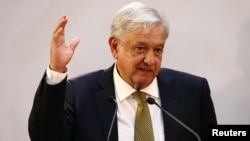Mexico's wage commission said on Monday it planned to hike the country's minimum wage by 16 percent to around $5 per day and leftist President Andres Manuel Lopez Obrador pledged further increases to keep salaries apace with inflation.
The salary commission, made up of government, business and labor representatives, said the daily minimum wage would rise to 102.68 pesos from 88.36 pesos on Jan. 1, the biggest such hike since 1996.
"During many years the minimum wage has lost its purchasing power. Some say it has lost 70 percent of its purchasing power over the last 30 years," said Lopez Obrador.
"We're never going to have wage (increases) below inflation," said Lopez Obrador, who took office on Dec. 1.
Low wages have helped to attract foreign companies to Mexico and create jobs, but also encourage migration to the United States. U.S. President Donald Trump argues that low wages south of the border kill U.S. jobs.
Lopez Obrador has called for doubling the minimum wage in northern states that border the United States in a bid to reduce inequality with neighboring U.S. areas.
In the area within 25 kilometers (16 miles) from the U.S. border, the minimum wage will be increased to 176.72 pesos per day, Mexican employers' confederation Coparmex said in a statement.
Lopez Obrador's maiden budget, delivered on Saturday, was welcomed by markets for pledging to stick to fiscal discipline, but the wage policy raised concerns that it could hit inflation and spark higher interest rates.
Benito Berber, chief economist for Latin America at Natixis, said Lopez Obrador's new take on wages, including the commitment to keep pace with inflation, could push Mexico's central bank to raise interest rates on Thursday.
"It seems the government is willing to accept higher inflation and perhaps stickier inflation," Berber said. "Banxico has been clear that wage increases above productivity would entail tight monetary policy."
($1 = 20.1160 Mexican pesos)





